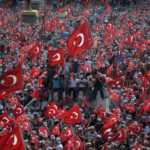Journalism requires skepticism and a willingness to pursue stories that cause discomfort to the powerful. Erdogan has effectively made that illegal in Turkey. Plenty of insightful articles about Turkey are still being written—by journalists in exile.
According to an old cliché, truth is the first casualty in war. Truth has also been a victim of President Recep Tayyip Erdogan’s war on Turkish democracy. The practice of journalism, as that word is traditionally understood, is all but impossible in Turkey today. Journalism requires skepticism and a willingness to pursue stories that cause discomfort to the powerful. Erdogan has effectively made that illegal in Turkey.
The story of how this happened is important far beyond Turkey. From Belarus to Nicaragua, from Russia to the United States, from Poland to the Philippines, authoritarian leaders have recognized that the press is too potent a force to ignore. Their goal is to transform journalism into public relations. In Turkey, that means turning the press into a cheering gallery for Erdogan, his cronies, and his policies.
Huge stories are left untold in Turkey. The country would be greatly enriched if reporters were able to research and write freely about subjects as varied as the Kurdish War and the corruption of the ruling elite. Plenty of talented journalists are more than eager to pursue those and countless other stories that would reflect the reality of life in Turkey today. Forbidden to do so on pain of imprisonment, they must either muzzle themselves or choose exile. Plenty of insightful articles about Turkey still appear, including ones that clearly document the country’s descent into one-man rule. All of them, however, are written by journalists outside Turkey. No one inside the country may produce them.
Turkey has lived through epochs like this in the past. After the military coup of 1980, journalists were among those arrested and the press was strictly forbidden to explore topics that the government found uncomfortable. Later there followed a period of relative openness. Turkish journalism became more vibrant and authentic. It was not fully free, but compared to today, that seems in retrospect to have been a golden age.
Erdogan has used a variety of tactics to subdue the press. The most obvious is intimidation. Some of Turkey’s best and brightest languish today in jails. Reporters know that prosecutors, who are under government control, will happily sentence anyone who crosses the unwritten but well-understood boundaries of free speech. That has produced a culture of self-censorship. Reporters know what they may and may not report, and editors know what they may and may not print.
Another successful tactic has been to bring major media conglomerates, which own both print and broadcast outlets, under government control. Wealthy supporters of the government have bought controlling shares that give them the right to decide who may appear on the air, what topics they may discuss, and what they may say about those topics. These tycoons are richly rewarded for their cooperation, winning government favors for their other businesses.
One important role of the press in today’s Turkey is to endorse and cheer Erdogan’s campaigns and to demonize those he considers enemies, both at home and abroad. Reporting swings according to what the government wants citizens to hear. When Erdogan launches one of his periodic campaigns against Kurdish identity, stories about “evil” Kurds start to appear. If he decides he needs political support from Kurdish parties, those stories are replaced by others about “good” Kurds. All must praise Turkey’s seizure of territory inside Syria. The press calls Syrian refugees inside Turkey either lazy bloodsuckers or hardworking unfortunates, all according to the line the government decides it wants to take at any moment.
Turkish journalism thrives in exile. Depending on the result of the forthcoming election, it may once again thrive inside Turkey itself.


